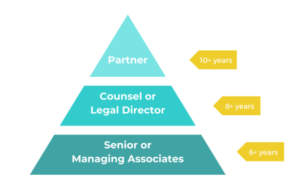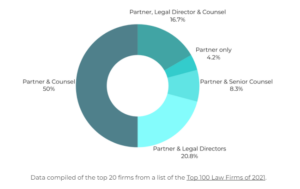Harvey John
Unit 2 Ferry Wharf
Hove Enterprise Centre
Basin Road North
Portslade, East Sussex
BN41 1BD
Being a Partner at a law firm is considered by many to be the pinnacle of a legal career. Beginning as an undergraduate (or more recently, an apprentice), you work your way up through the ranks to a highly respectable position at the crest of the proverbial peak as a Partner. But what if this doesn’t appeal to you?
You’re not alone. Recent events have revealed that the title of Partner may not be worth the pressure placed on those who desire it. With research dating back twenty years noting the stress placed upon lawyers, it’s no wonder that alternatives to partnership have been devised and are becoming increasingly sought after.
This is why we’ve decided to take a closer look at the concept of business partnership in the legal sphere, or in particular, the possible routes toward ‘success’ as a solicitor.
The definition of ‘Partner’ is not as clear-cut as it once was.
A Partner is an individual whose title has been earned through many years of work. They certainly reap the benefits of their experience financially through their position, but this comes with its own set of duties and liabilities.
Their responsibilities lie within both managerial duties and business development, as Partners are expected to bring business to the firm while managing junior lawyers alongside their own caseload.
If the title of partner is at the top of the pyramid, what lies below it?
It’s all well and good to discuss the virtues of partnership, but that means little without considering what it takes to get there.
Firstly, partnership isn’t necessarily the apex of the pyramid. It lies just below the title of ‘Managing Partner’, but for the purpose of this discussion, we’ll leave that topic for another day, as it comes with its own myriad of possible routes and questions.
And secondly, the title of Partner may itself be divided into two sections, with Equity Partners (who have a financial stake in the business) resting just above Salaried Partners. Most firms will have both, although this differentiation is rarely disclosed publicly.

Typically, the rungs on the legal career ladder correspond with a certain number of years of experience, or post-qualification experience (PQE), as it’s referred to in the legal sphere. The above graphic depicts the amount of PQE most commonly associated with these titles, though these are dependent on the selected parameters of each law firm.
However, the use of these terms varies from firm to firm, as depicted below.

What is a Counsel or Legal Director, you may ask?
These are less commonly used titles that separate the Partners from the Senior Associates, and are used in several ways, often synonymously. They depict lawyers who have ascended the legal career ladder into positions of upper seniority, much like Partners, but they mean something slightly different.
A Legal Director, or Counsel, is considered a senior solicitor who warrants a title above Senior Associate due to their 8+ years of amassed PQE but desires a less managerial role than that of a Partner. This title allows a lawyer to continue to hone their specialist technical expertise without necessarily the wider firm management responsibilities; they’re able to focus on building upon and utilising their expert knowledge away from the pressures of business development and financial liability. It is sometimes seen as a ‘stepping stone’ to Partnership, or even an alternative to it.
But all of this depends.
As we’ve established, all of the above is dependent on the law firm you choose to navigate your legal career with. The definition of a Partner depends on the firm, as does the use of terms such as Legal Director or Counsel, or perhaps their lack of use. The amount of post-qualification experience required to ascertain these titles depends on the firm, as well as the individual who has gained this experience and their ability to utilise and exercise it to their full potential. For example, a lawyer may be promoted to partner prior to gaining 8 years of PQE, and in the same vein, another lawyer may take far longer to achieve the same title.
That is to say, legal success is in the eye of the beholder. With the legal profession becoming increasingly accessible through numerous routes, who is to say what the upper part of the legal hierarchy will look like in the near future? The definitions of success and the titles that signify seniority may change as a wider variety of people embark on their journey towards becoming lawyers.
Professional success is definitely subjective, but we hope that we’ve given you some clarity with this insight into the somewhat illusive journey towards achieving success as a legal professional.
If you have an idea of what your journey towards success looks like but are unsure how to achieve it, make sure you utilise the resources available to you. Arrange a chat with a specialist recruiter to talk through what you envision your career trajectory to look like, and they may even have the ideal role in mind to keep you on track to your version of success. Stay tuned for an alternative version of this blog, where we explore the route towards success as an in-house lawyer.
Reach out to Hayley Rose for expert advice on maintaining your path towards legal success. Or, check out the Media Hub, where we share our insights into the legal sphere alongside tips for navigating your way through job applications and interviews.
Author

Chloë's responsibilities encompass candidate sourcing, market research, trend analysis, and content development, all of which contribute toward elevating Harvey John's dedicated legal recruitment division and enhancing its sincere reputation for achieving success through clarity and expertise.







